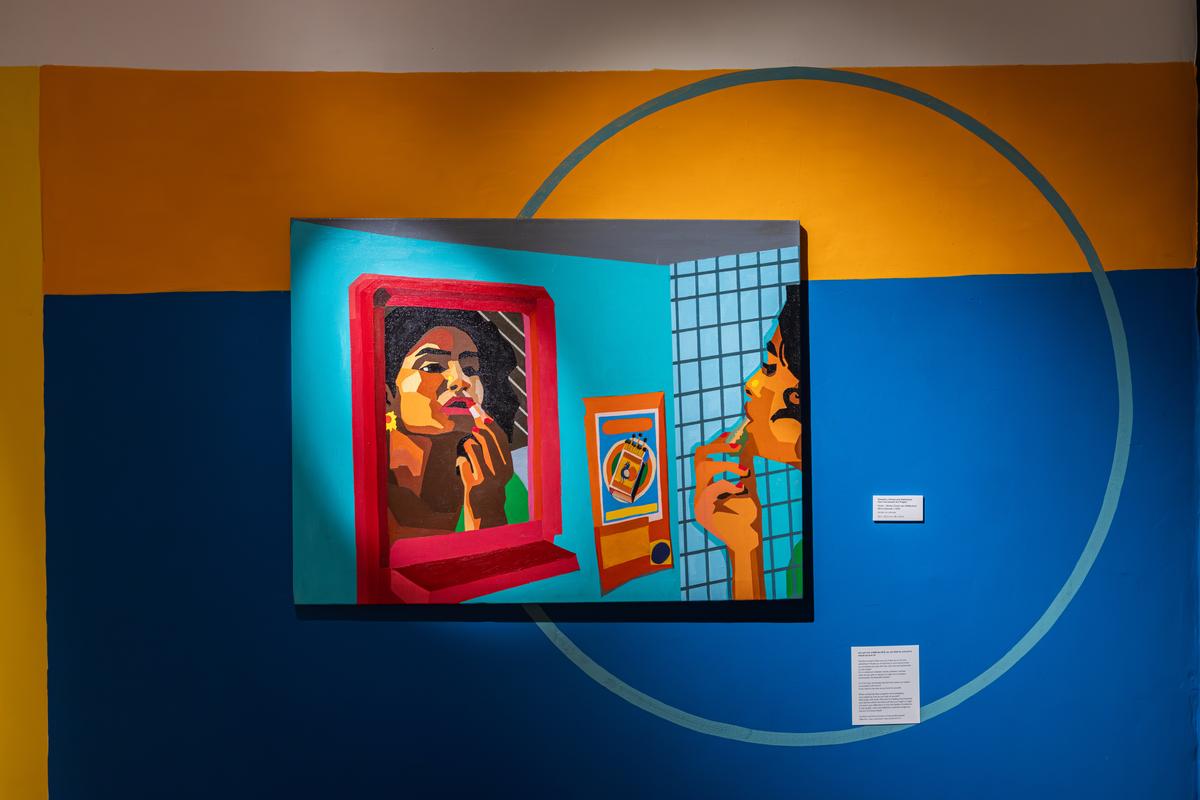
Almost a decade ago, a group of transwomen painted a mural in Bengaluru’s bustling K.R Market, beginning their journey of talking about inclusivity and equality through art. Today, their artworks are displayed in their first solo exhibition in Mumbai, celebrating identity and resistance.
The ongoing exhibition, On the Cusp of the Eighth Dayat Mumbai’s Gallery XXL showcases the life and works of about 13 transwomen from the Aravani Art Project, a trans and cis women-led art collective. It also celebrates the nine-year anniversary of the project’s work towards challenging social stigma, discrimination, and systematic inequality faced by the transgender community by utilising public art.
Opening last month with a panel discussion, performances, walkthroughs and painting workshop, the exhibition has carved out space for the voice of transwomen. “We didn’t set out to drastically change people’s perspective through the exhibition but rather wanted to make people curious about the transgender community,” says Poornima Sukumar, founder of the Aravani Art Project, which now has 35 members across India.
It showcases the life and works of about 13 transwomen from the Aravani Art Project
| Photo Credit:
Courtesy of Gallery XXL
Of festivals and constellations
For the artists and Sukumar, the idea was to include lesser-known cultural aspects of the transgender community such as their relationship with mythology. For instance, in the Constellation series, four paintings focus on important mythology-based dates for the transgender community and the festivals they celebrate.
“People are usually not aware of the various cultural differences that exist within the community. They often assume that the trans community, in general, follows just one belief, which is not true. There are different communities and they celebrate different festivals,” says Sukumar, adding that many of these trans-related festivals are disappearing, and lack visual documentation.
In this series, the paintings feature embroidery and acrylic on canvas and depict four festivals that are relevant to the trans community and the particular constellations when they take place. While the Bonalu festival is popular among the transgender community in Andhra Pradesh, Telangana, and Odisha, the Yellamma festival is celebrated in Karnataka as well as Telangana.

It also celebrates the nine-year anniversary of the project’s work towards challenging social stigma
| Photo Credit:
Courtesy of Gallery XXL
The idea and the name for the Aravani Art Project also came from a festival, specifically, the 18-day Koovagam festival in Tamil Nadu celebrated by the transgender people of the region, Antagonistwho Sukumar set out to document back in 2013. The exhibition’s title is also rooted in the story of Aravan’s sacrifice, the central deity of Aravanis, on the eighth day of the Kurukshetra battle depicted in the Hindu mythology, Mahabharata. This sacrifice is commemorated during the Koovagam festival..
Addressing double standards
These festivals have become spaces where trans-people suddenly become one with the rest of society because they are celebrated as sacred beings, Sukumar says. “The juxtaposition of the festival days and what they go through in their daily life such a contrast. They live in this duality where people either treat them as gods or disrespect them,” she explains. It’s this doubleness that the exhibition also highlights.
Other paintings at the exhibition include the Clap series, which refers to the clap, a signature style of the mode of communication for the transgender community, and the Mirror series, which celebrates the love transwomen have for themselves despite the perceptions society imposes on them. “I have worked on three paintings and to see them in a gallery is a feeling like no other,” says Shwetha T, one of 13 transwomen from the Aravani Art Project whose paintings are on display. Sukumar says one of the objectives of this exhibition was to help trans women experience the gallery space.

The idea was to include lesser-known cultural aspects of the transgender community, such as their relationship with mythology
| Photo Credit:
Courtesy of Gallery XXL
Access to galleries
Reclaiming public spaces is not new for the transwomen from Aravani Art Project who have turned various public places, from walls to underpasses, into their canvases, in Bangalore, Chennai, Mumbai, and Delhi. “Space is what everybody’s fighting for. Not just physical space but a space in society where they can express themselves and feel respected,” says Sukumar. But for the transgender community, public spaces often come with a sense of danger, of discrimination, threats, and violence. Initially, when transwomen had to travel to different parts of these cities to paint a mural, they would feel unwelcome, Sukumar explains. “Over time, the transwomen have become more comfortable with walking around and just existing in public spaces. Their love for art became a reason to step out of the house and learnt to fight back if required,” she adds.

Other paintings at the exhibition include the Clap series
| Photo Credit:
Courtesy of Gallery XXL
Shwetha remembers when schoolchildren would see them in the streets and call her names, making her retreat into a shell. Years later, when she went to a school to do artwork through the Aravani Art Project, she recalls how children would address her as ‘ma’am’ and ask if she needed anything. “It is respect that we want. It made me very happy,” she says.
Now, through the exhibition, they have opened the door to another public space: art galleries. Although the art space might be more inclusive than when the project started, exhibitions like these start important conversations, Sukumar says. “There is still a lot of prejudice and classism in the art world. But creating space in the art world that is often seen as exclusive, the Aravanis bring with them the joy and colour of inclusivity,” she adds.
The exhibition, On the Cusp of the Eighth Day, is being held at Gallery XXL, Colaba, Mumbai till February 22.
The independent journalist specialises in gender, culture, and social justice.
Published – February 20, 2025 06:59 pm IST








